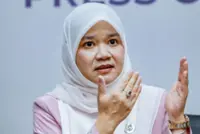Vision for the future: Education institutions must prepare graduates to drive advancements in research, innovation and technology. — 123rf.com
Malaysia’s healthcare landscape has evolved rapidly in recent decades, with the Covid-19 pandemic serving as a critical turning point.
The crisis exposed not only existing vulnerabilities but also opportunities for improvement, emphasising the need to future-proof the nation’s healthcare system.





